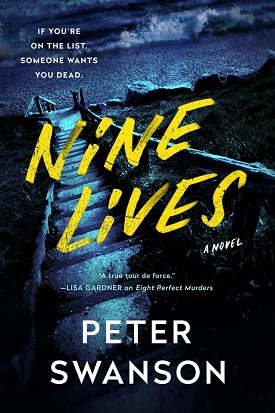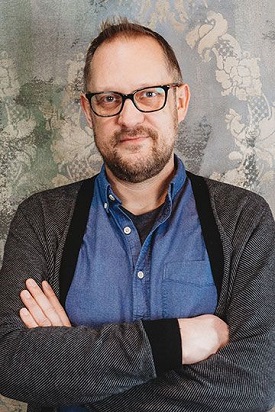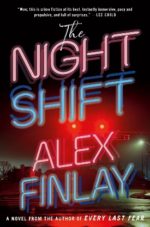 Synopsis:
Synopsis:
If you’re on the list, someone wants you dead.
Nine strangers receive a list with their names on it in the mail. Nothing else, just a list of names on a single sheet of paper. None of the nine people know or have ever met the others on the list. They dismiss it as junk mail, a fluke — until very, very bad things begin to happen to people on the list.
First, a well-liked old man drowns on a beach in the small town of Kennewick, Maine.
Then, a father is shot in the back while running through his quiet neighborhood in suburban Massachusetts.
A frightening pattern is emerging, but what do these nine people have in common? Their professions range from oncology nurse to aspiring actor, and they’re located all over the country. So why are they all on the list? And who sent it?
FBI agent Jessica Winslow is on the list herself, and is determined to find answers.
Could there be some dark secret that binds them all together? Or is this the random work of a murderous madman?
As the mysterious sender stalks nine strangers, they find themselves constantly looking over their shoulders, wondering who will be crossed off the list next . . .
Review:

Peter Swanson is the New York Times bestselling author of eight novels, including The Kind Worth Killing and Her Every Fear, which have been translated into more than thirty languages. In addition, his stories, poetry, and features have appeared in a variety of publications, including The Atlantic Monthly and The Guardian. Swanson earned degrees from Trinity College, the University of Massachusetts at Amherst, and Emerson College, and lives in Massachusetts with his wife and cat.
Swanson is known for paying homage to great mystery writers in his novels, which are sometimes reimaginings of the originals. In Nine Lives he draws from Agatha Christie’s classic, And Then There Were None, to craft an intriguing and absorbing story of nine perfect strangers, all of whom find their names on a cryptic list delivered to them via mail. None of them recognize the other names and all of them are baffled as to the list’s origin and meaning, and why their names have been linked with the others on the list. Swanson’s diverse cast of characters are Matthew Beaumont, a suburban father in Massachusetts; Jay Coates, an aspiring actor in Los Angeles; Ethan Dart, a singer-songwriter in Texas; Caroline Geddes, an English professor in Michigan; Frank Hopkins, the owner of the Windward Resort in Kennewick, Maine; Alison Horne, a married man’s paid mistress in New York City; Arthur Kruse, an oncology nurse in Massachusetts; Jack Radebaugh, a retired businessman who recently returned to his childhood home in Connecticut; and Jessica Winslow, an FBI agent in New York.
The story opens with the death of Hopkins at his Windward Resort in Maine. When his body is discovered, he is holding a torn envelope addressed to him and containing the list of names. Detective Sam Hamilton, Kennewick’s only police officer, knew Frank for many years and immediately begins investigating his suspicious death. A few hours later, Jessica learns about Frank’s death and his possession of the same list she received the prior day. Swanson devotes short, successive chapters of the book to introducing his characters and describing their respective receipt of the list. Some of them simply toss the list into the trash without giving it another thought, convinced it is just junk mail, while others immediately begin searching for any available clues about its significance. Swanson details Jessica’s contact with or efforts to make contact with them in an attempt to piece together any possible connections. Some characters are immediately more sympathetic than others. Caroline Geddes, the lonely, unattached professor who lives alone with her cats in a two-bedroom cottage in Ann Arbor, immediately thinks, “It’s a list of death. Someone has marked us for death,” just as she thinks every telephone call will bring news of a tragedy. She allows for “personal interpretations of literary works” in her own life. But then there’s Jay Coates, a would-be actor going to auditions and callbacks in Hollywood, but having little success in the entertainment industry. He is jealous and spiteful about his friend’s success, and stalks random women, fantasizing about abusing or killing them.
Arthur Kruse’s name rings a bell with Jessica. She seems to remember that her father, Gary, had a friend named Art Kruse whose lake house he visited. Arthur is still mourning his husband, Richard, and has had no relationship with his father since Art rejected him when Arthur came out. Even so, she asks Arthur to question his father about that tenuous connection. Jessica has a very personal stake in the outcome of the case, obviously, and works to learn more about Frank Hopkins and identify each person listed. The Windward Resort also sounds vaguely familiar to her, perhaps because her family vacationed on the southern coast of Maine when she was thirteen years old.
The recipients of the list also search for any connection they might have to the others. Ethan and Caroline can only discern that their grandparents came from the Boston area, but they strike up a friendship born of the presence of their names on the list, as well as their mutual love of the works of a particular poet. For Caroline, it is exciting and breaks up the monotony of her solitary existence and Ethan finds himself drawn to Caroline, as well. They soon make ill-fated plans to meet.
When the second murder occurs, it is no longer possible to write the list off as a coincidence. Rather, Jessica likens it to the morning of September 11. “I remember watching the news after the first plane hit, and the world just thought it was a terrible accident. Then the second plane hit, and everything changed.” She and her supervisor agree that the second murder is the equivalent of that second plane, and it is time for the FBI to provide protection to everyone on the list. But one by one, the nine continue dying, their deaths coming about in distinct and sometimes horrific ways, despite the security measures employed. Sam and Jessica proceed with their investigations, and Sam also becomes convinced that there is nothing accidental or coincidental about the order in which the deaths are occurring. Frank received the list first and was the first to die, and Sam suspects that finding out about his past is crucial to solving the crimes. Sam turns to his grandmother’s collection of Agatha Christie books, and recalls reading And Then there Were None with its original, racist title as a child. He still has that valuable edition of the book that he re-reads yet again, convinced that Frank Hopkins and the other “unlucky souls” on the list somehow resemble the characters and plot of that novel.
At one point, Swanson injects an anonymous hit man into the mix, further complicating matters with a pulse-pounding game of cat and mouse. But who hired him? And why?
Swanson’s telling of the story is meticulous and methodical. As it proceeds, the substance of his imaginative plot gradually comes into focus, and he reveals more details about his characters’ backgrounds and histories at expertly-timed junctures while he accelerates the story’s pace. He endears some characters to readers, making their inevitable demise nothing less than crushingly disappointing. Swanson returns to And Then There Were None as Sam closes in on the truth and the killer’s identity is revealed, along with the motive, via an old-fashioned, full explanation, delivered by the killer. It’s a description of a decades-long obsession with retribution and revenge in response to grievous behavior that resulted in unspeakable loss and a lifetime of guilt. The conclusion is satisfying, especially given that readers will most likely be unable to pull together all the threads of Swanson’s complex and intricate plot on their own.
Nine Lives is an entertaining and masterfully constructed homage to Christie’s original work that will keep readers guessing up to the very last chapter, and rewards them with a shocking but delightful ending.
Excerpt from Nine Lives
WEDNESDAY, SEPTEMBER 14, 5:13 P.M.
Jonathan Grant, unless he let her know ahead of time that he couldn’t make it, always visited on Wednesday evening. His wife had a standing “girls’ night out” on Wednesdays — occasionally in the city, but usually in New Jersey — so Jonathan would leave the office by five and be at Alison’s one-bedroom apartment in Gramercy Park by five-thirty at the latest.
Alison Horne was ready when the doorman buzzed up to let her know Jonathan was on his way.
She met him at the door, and he presented her with a bottle of Sancerre, a Bulgari scarf she didn’t think she’d ever wear, and that day’s mail that he’d picked up from the doorman. She started to flip through the mail, but he stopped her and led her to the bedroom. She was in a white satin robe—it was how he liked to be greeted—and she slid back onto her bed while he undressed. He looked great for a man in his early seventies, full head of hair, fairly trim, but the muscles in his chest and arms were beginning to sag. He slid next to her on the bed, already erect, and with the red mottled skin on his face and neck that was a telltale sign he’d taken some kind of ED pill as soon as he left the office. Sometimes he took it just after he arrived, in which case they’d drink the bottle of wine first while the pill kicked in.
Afterward, while Jonathan dozed, Alison took her second shower of the day, then dressed as though they were going to go out for dinner later, although that hadn’t been confirmed. She opened the wine and poured herself a glass, then looked through her mail. Two catalogues, an Amex bill, and an envelope with no return address. She opened it, curious, and pulled out a single folded sheet of paper, and stared at a list of names.
Matthew Beaumont
Jay Coates
Ethan Dart
Caroline Geddes
Frank Hopkins
Alison Horne
Arthur Kruse
Jack Radebaugh
Jessica Winslow
She frowned and pressed the sheet of paper flat onto the coffee table, telling herself that she’d show it to Jonathan. A shiver went over her skin, and she shook out her limbs to make it stop. There was something vaguely threatening about receiving a list of names with no explanation. It occurred to her that it just might have something to do with Jonathan, currently dozing in her bedroom. Although she knew relatively little about him, considering the time they spent together, she did know that he had a lot of money. And people who have money usually have enemies. It made her wonder if he would recognize any of the names on the list, besides hers.
He emerged from the bedroom fully dressed, accepted a glass of wine, then looked at the sheet of paper Alison handed to him. “This mean anything to you?” she asked.
He shook his head.
“What is it?”
“I just got it, in the mail.”
“Was this all?”
“Yeah. Strange, huh?”
“Strange.”
He handed the list back to Alison. She asked: “We going to dinner?”
“I would if I could, but I got roped into dinner uptown with some hedge fund guys. Sorry, Al.”
She shrugged. When they’d first begun this relationship — a year and a half ago — she used to make a fuss when he had to leave her. She did it for him, mostly, till she realized that he didn’t need those kinds of reassurances. He was in it for the sex and the company, and she was in it for the money, and, she supposed, the sex. Before he left, he gave her a pre-paid Visa card, telling her it was an anniversary gift, in case she didn’t like the scarf.
“How much is on it?” she asked. Again, something she would never have asked when they were first together.
“I’ll let you be surprised. Don’t try to buy a car with it, though.”
After he left, Alison Horne called her best friend, Doug, and asked if he’d like to have dinner that night. On her.
THURSDAY, SEPTEMBER 15, 10:05 A.M.
It was the most interesting piece of mail that Arthur Kruse, having just returned from physical therapy, received that morning.
He opened the envelope, not expecting anything of note, and was surprised to find a short list of names, including his. He didn’t recognize any of the other people on the list.
There were three hours in the day before Arthur was due for his shift as an oncology nurse at Cooley Dickinson Hospital in Northampton. He’d just begun reading A World Lit Only by Fire by William Manchester. Since reading A Distant Mirror over the summer, he’d found he didn’t want to leave the Middle Ages. Something about those past lives, the constant suffering, the search for God, acted as the only balm to Arthur’s state of mind since the car accident, nearly a year ago, that took the life of his husband, Richard, their cocker spaniel, Misty, and most of the function of Arthur’s left leg. He couldn’t quite believe it had been a whole year. Joan, his minister—and Arthur’s closest friend—told him it would be at least two years until he began to feel some semblance of normality, of happiness, of a return to his life, but Arthur wondered. The past endless year felt like it was just going to be repeated ad infinitum. Nothing helped. That wasn’t entirely true. Medieval history helped. He gingerly slid into his reading chair and picked up where he’d left off in Manchester’s book, not nearly as good as Tuchman’s. He read two pages, then drifted off, waking an hour before he had to be at the hospital.
His leg was always at its worst after midday napping, and he found himself limping to the kitchen to put on hot water for a cup of tea. While waiting for the water to boil, he looked out the window over his sink and caught a glimpse of the fox—the one he’d named Reynard—skirting the edge of his property. It was moving fast, and just before it ducked into the trees, it turned its head and Arthur thought he saw something—a small rodent maybe—in its jaws. It inexplicably made Arthur happy for the moment. The last time he’d seen Reynard he’d been worried about how skinny and ragged he looked.
The day was overcast, and the willow tree down by the brook had just begun to exhibit a yellowish cast. He drank the tea at his computer and thought of the list he’d gotten in the mail. What had it meant? Some strange automatic mailing, a computer screwing up somewhere in the middle of the country and sending out some random names. It was a possibility. Ever since Richard’s passing he’d taken to giving small amounts of money to multiple charities, ensuring that his name was on about a hundred different mailing lists, probably specified as an “easy touch.” That was okay. There were worse things to be, and getting mail was actually something he looked forward to. He’d been one of those children who sent away for catalogues just to receive them, until his father found out and put a stop to it.
He finished his tea, returned an email to Joan to let her know he was available to do the flowers for church that Sunday, and prepared to go to work.




Comments are closed.